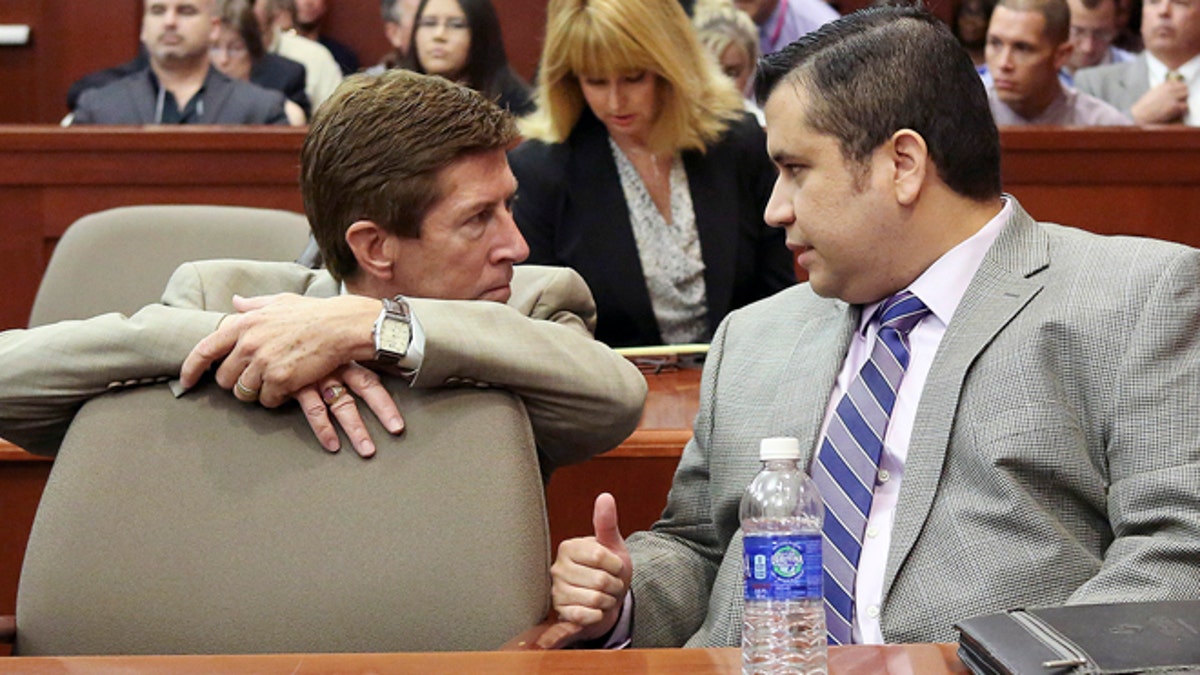
June 27, 2013: George Zimmerman, right, speaks with defense attorney Mark O'Mara during his trial in Seminole circuit court in Sanford, Fla. (AP/Orlando Sentinel, Jacob Langston, Pool)
As millions nationwide remain transfixed on the murder trial of George Zimmerman, the man next to the former neighborhood watch volunteer — lead defense attorney Mark O’Mara — is also getting his day in the spotlight.
O’Mara, 57, has been praised in news reports as a brilliant courtroom tactician and a skillful trial attorney with more than three decades of experience, primarily as a family attorney in central Florida. But the New York City native has also worked as a prosecutor in all types of criminal proceedings, including traffic crimes and death penalty cases. He also serves as the president of the Seminole County Bar Association and has previously appeared as a legal pundit for a local Orlando television station during the Casey Anthony trial in 2011.
O’Mara, who graduated from the University of Central Florida and the Florida State University College of Law, reportedly leads a quiet life outside of the courtroom, enjoying motorcycle rides with his wife Jen and spending time with his German shepherd Timber. He has also utilized his increased exposure to begin a conversation about “race in America,” according to his blog.
“During the course of the Zimmerman case, I have become increasingly aware that the case has become a focus point for many issues well beyond those found in the ‘traditional ‘ criminal case,” the O’Mara Law Blog reads. “These include gun rights issues, ‘Stand your Ground’ issues and civil rights issues. As to the last issue, I am concerned that the more people consider an acquittal of George Zimmerman to be a loss for civil rights, the worse it will be for civil rights. We are confident that George should and will be acquitted, and I am deeply concerned we are going to miss the opportunity to have a constructive conversation about race in America.”
O’Mara hopes, according to his blog, that the difference between the Zimmerman case and “real” civil rights cases can be separated from one another.
“I’ve been saying on television for months that we should use this case to start the conversation about race, particularly the concerns regarding disparate treatment in the criminal justice system, and I’ve set up this website to begin that conversation,” the undated posting continues. “For my entire career, I have defended the rights of citizens accused, and I’ve focused inquiry when the system failed its citizens. Now, more than ever, is the time to reenergize the conversation about the system we all must trust and rely upon.”
O’Mara, who was raised Catholic, has said his biggest inspiration was his father, a World War II veteran who later raised five children on a fireman’s salary, CBS 12 reports.
O’Mara, for the time being, is seemingly relishing his moment in the spotlight and is more concerned with the well-being of his client and potential jurors than taking walks down memory lane. He recently told reporters about the impact of social media on the case, as the trial began with attorneys scouring potential jurors’ profiles, ultimately using Facebook postings to keep two off the jury. Witnesses, O’Mara noted, have not been immune either.
“So it’s been an amazing sort of umbrella in this case, the whole sort of social media presence, and what it means both in investigation, to interaction, to now having to react to it as a lawyer,” O’Mara said.
But the safety of O’Mara’s most notorious client is also not far from the forefront of his mind. He told CNN late Monday that Zimmerman, 29, will never be safe, regardless of the trial’s outcome.
“First of all, my client will never be safe because there are a percentage of the population who are angry, they’re upset, and they may well take it out on him,” O’Mara said. “So, he’ll never be safe.”
Whatever the outcome, O’Mara said he hopes the public realizes that a fair trial was conducted.
"Anybody who pays attention to the facts of this case, listens to the evidence, will not leave that courtroom thinking that George Zimmerman is guilty of anything,” O’Mara continued. “And, if a jury agrees, they should not and cannot be frustrated with the outcome because the State's put on a good case, we put on a good case, everything that should get out to this jury has been out … They decide on the facts of the case, we as a society — black, white, everybody — need to look at this case and say justice was in fact accomplished here, because a fair trial was held."

